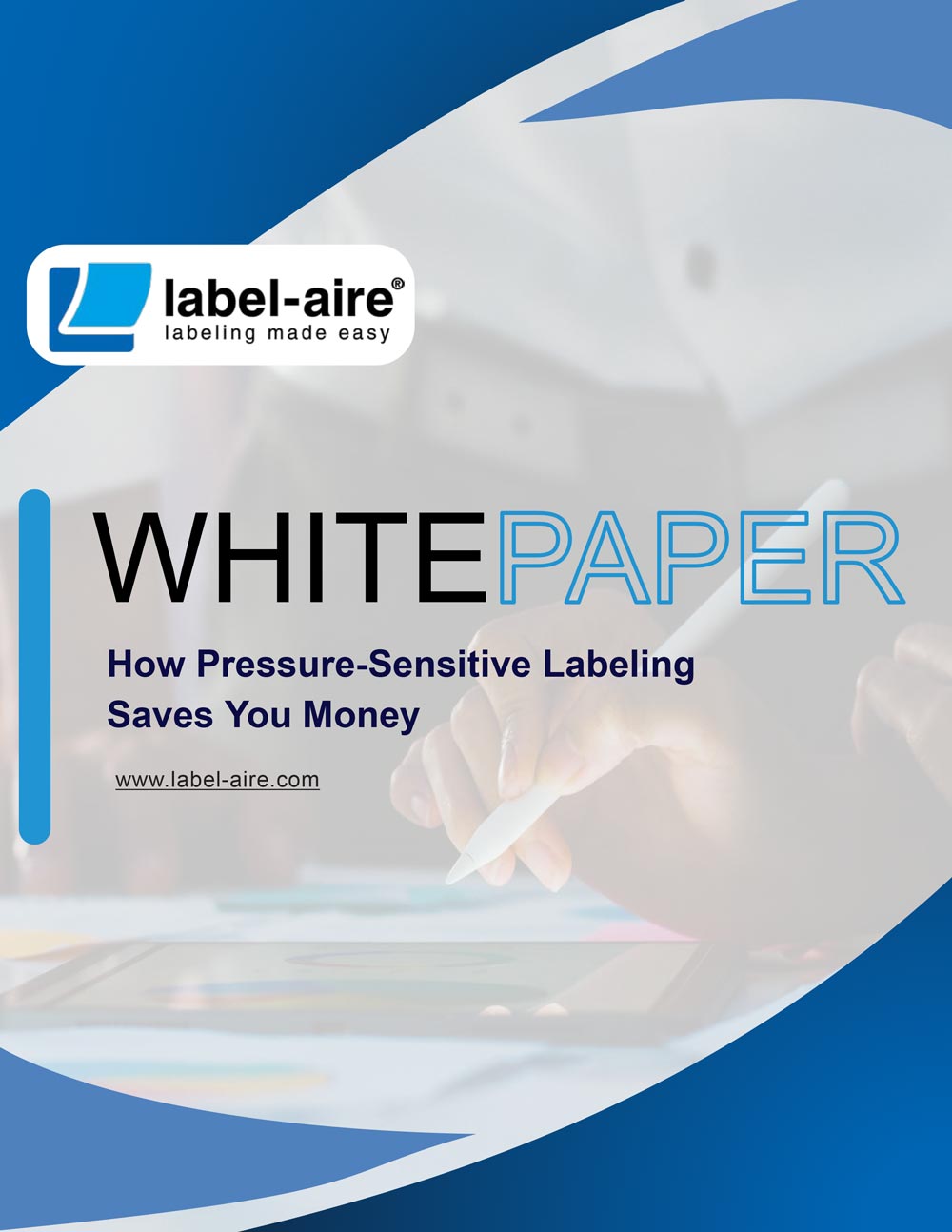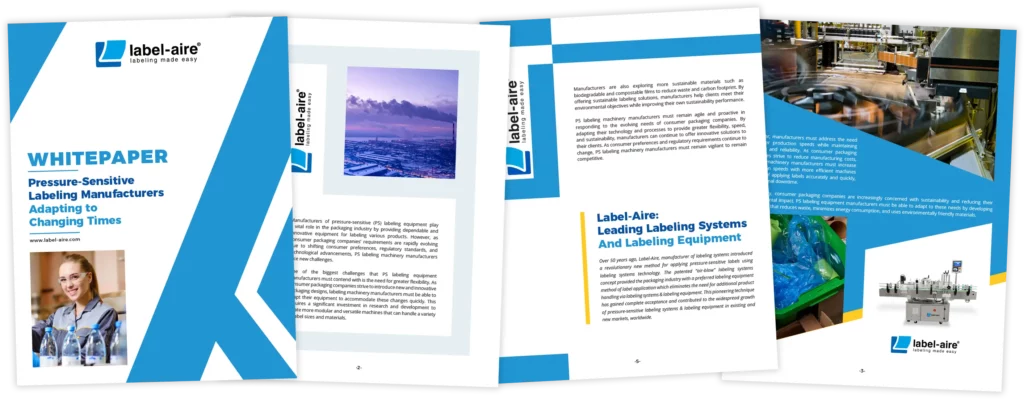Pressure-sensitive labeling technology offers a myriad of cost advantages that significantly benefit businesses. One of the primary advantages is the substantial reduction in labor costs, which can have a cascading impact on a company’s overall operational efficiency and bottom line. When compared to alternative labeling technologies like wet-glue labeling or shrink sleeve labeling, pressure-sensitive labeling stands out due to its minimal reliance on manual labor.
The labor cost reduction achieved through pressure-sensitive labeling is advantageous in several ways. Firstly, it results in immediate cost savings for businesses. By reducing the need for manual labor, companies can trim down their labor-related expenses, which is especially critical in industries where labor costs represent a substantial portion of the overall expenditure.
Moreover, this technology contributes to overall operational efficiency by streamlining the labeling process. Since pressure-sensitive labels can be applied quickly and with precision using automated machinery, there’s a decrease in the time and effort required for labeling tasks. This enhanced efficiency ensures that products are labeled consistently and accurately, reducing the chances of errors or mislabeling, which can be costly to rectify.
Another noteworthy benefit of the reduced labor requirement is the ability for businesses to reallocate their workforce to other critical areas. With fewer employees needed for labeling tasks, companies can deploy their skilled labor to more value-added activities such as quality control, product development, customer service, or marketing. This redeployment not only maximizes productivity but also contributes to cost-effectiveness by ensuring that labor resources are used optimally.
Moreover, pressure-sensitive labeling technology offers greater flexibility and adaptability. It can be used on a wide range of packaging materials, making it suitable for various industries and product types. This versatility ensures that businesses can efficiently label products across different lines and adapt to changing market demands with ease.
Pressure-sensitive labeling technology plays a pivotal role in enhancing operational efficiency by providing a swift and seamless product decoration. The efficiency gains achieved through this technology have several profound implications for businesses, all of which can have a positive impact on their bottom line.
First and foremost, pressure-sensitive labeling technology is engineered to work rapidly and smoothly. It is designed for speed and precision, and the process of applying labels can be automated to a great extent. As a result, it significantly boosts production rates. Products can be labeled at a pace that would be impractical, if not impossible, with manual labeling methods. This high-speed label application minimizes downtime during the labeling process, ensuring that production lines can run continuously, with minimal interruptions or delays.
The increased efficiency associated with pressure-sensitive labeling directly translates into higher output and, consequently, higher revenue. Businesses can produce and label more products within a given time frame, which means that they can supply the market with a greater volume of goods. This higher output capacity not only meets customer demands more effectively but also allows companies to quickly capitalize on market opportunities and respond to fluctuations in demand with agility.
Consistency is another key benefit of pressure- sensitive labeling technology. Products are labeled uniformly, with an extremely high degree of precision, ensuring that labels are placed correctly and consistently on each item. This consistency is essential for brand image and customer satisfaction, as it minimizes the likelihood of errors or mislabeling. Moreover, it helps maintain a professional and appealing appearance for the products, reinforcing the brand’s reputation and trustworthiness.
Another noteworthy cost-saving aspect of pressure-sensitive labeling technology pertains to the significant reduction in maintenance expenses. This is primarily attributed to the streamlined and equipment-efficient nature of pressure-sensitive labeling, which distinguishes it from certain alternative labeling methods that rely on additional machinery, such as heat tunnels or steam generators.
One of the most compelling features of pressure-sensitive labeling is that it doesn’t necessitate the use of supplementary equipment like heat tunnels or steam generators, which can be costly to both acquire and operate. These additional machines often require substantial upfront investments, and their ongoing operation can lead to substantial utility bills, making them a potential financial burden for businesses. Additionally, these machines typically require periodic maintenance to ensure they operate effectively and safely.
Furthermore, the reduced reliance on supplementary equipment like heat tunnels or steam generators means fewer components that can malfunction or require maintenance. In practical terms, this translates to a decrease in the need for specialized maintenance personnel, their training, and the associated spare parts and repair costs. This streamlined approach simplifies the maintenance requirements of the labeling process, resulting in less downtime and fewer unexpected repairs.
Pressure-sensitive labels present a versatile and highly advantageous feature in terms of customization. This adaptability extends to the label’s size, shape, and design, enabling businesses to achieve a level of precision and product personalization that is not easily attainable with many other labeling methods. This customization capability provides a host of benefits, including reduced material waste, lower material expenses, and eco-friendly advantages.
One of the primary advantages of customizable pressure-sensitive labels is the substantial reduction in material waste. Traditional labeling methods often rely on standardized label sizes and shapes, which can result in a significant amount of unused or discarded label material. In contrast, pressure-sensitive labels can be tailored to precisely match the dimensions and contours of the product they are adhering to. This means that there is minimal to no unused label material, resulting in a significant reduction in waste. This reduction not only aligns with sustainable and environmentally friendly practices but also lowers disposal costs and decreases the environmental impact of a business’s operations.
Additionally, this customization ability plays a pivotal role in lowering material expenses. When labels are customized to fit specific products, businesses can optimize label dimensions to minimize the amount of label material required for each unit. This translates into direct cost savings as it reduces the need for excess label stock. As a result, businesses can allocate resources more efficiently and divert the cost savings to other areas of their operations, thus enhancing their overall financial sustainability.
Beyond the financial benefits, the eco-friendly aspects of pressure-sensitive labeling technology are noteworthy. By reducing material waste and choosing label dimensions that precisely match products, businesses actively contribute to environmental sustainability. The reduction in waste minimizes the burden on landfills and the consumption of raw materials, which aligns with eco-conscious practices and regulatory requirements. Consequently, businesses can enhance their corporate social responsibility image and appeal to environmentally conscious consumers.
Customizable labeling goes beyond mere considerations of size and shape; it also plays a crucial role in shaping a brand’s identity and marketing strategy. Pressure-sensitive labeling technology empowers businesses to craft unique and eye-catching label designs that are tailored to their specific branding and marketing objectives. This customization offers a plethora of opportunities to create distinct branding and marketing campaigns that can greatly influence customer engagement and loyalty, leading to increased sales and repeat business.
Additionally, pressure-sensitive labels provide the flexibility to run targeted and creative marketing campaigns. Businesses can use labels to convey specific messages, promotions, or storytelling that resonates with their target audience. These campaigns can be adapted to suit different seasons, events, or consumer preferences. By doing so, businesses can connect with their customers on a more personal and emotional level, effectively creating a bond that goes beyond the product itself. Such emotional connections are instrumental in building customer loyalty and encouraging repeat business.
Customizable labeling also allows businesses to cater to niche markets and adapt to changing consumer preferences. This agility is invaluable in a competitive marketplace where consumers are looking for products that align with their values and preferences. Pressure-sensitive labels can be easily modified to reflect these changing market dynamics, allowing businesses to respond swiftly to shifts in consumer behavior and maintain their competitive edge.
The aesthetic appeal of pressure-sensitive labels is a multifaceted factor that not only enhances a product’s visual appeal but also contributes to cost-saving and profitability in several ways. These labels are renowned for their high-quality appearance, which makes products stand out prominently on store shelves, capturing the attention of potential customers. This visual allure plays a pivotal role in influencing consumer purchasing decisions and can significantly increase the likelihood of products being chosen over competitors.
First and foremost, the high-quality appearance of pressure-sensitive labels adds a sense of professionalism and sophistication to a product’s packaging. The labels can be designed with vibrant colors, sharp graphics, and intricate details, creating a visually striking and memorable impression. This visual appeal is crucial in attracting consumers who are often inundated with choices on store shelves. When a product stands out due to its label’s aesthetic appeal, it not only garners more attention but also conveys a sense of quality and trustworthiness.
Moreover, this enhanced shelf appeal can lead to improved sales and market penetration. When products are consistently chosen over competitors due to their aesthetically pleasing labels, businesses can experience a surge in demand and customer loyalty. This increased demand can result in higher sales volumes and, consequently, higher revenues. Additionally, it can help a business establish a stronger market position, gaining a competitive advantage in the marketplace.
In addition to their role in enhancing aesthetic appeal, pressure-sensitive labels also provide a valuable layer of product protection. This aspect of pressure-sensitive labeling technology revolves around the labels’ inherent durability and their resistance to various environmental conditions, including moisture, heat, and physical stress. This durability ensures that products are not only visually appealing but also safeguarded during the entire supply chain process, including shipping, storage, and even when they finally reach the consumer’s hands. The result is a significant reduction in the risk of product damage and related expenses, translating into substantial savings for businesses in the long run.
One of the key advantages of pressure-sensitive labels is their resilience in the face of moisture. These labels are typically designed to withstand exposure to humidity, moisture, and even brief contact with liquids without compromising their adhesion or the integrity of the label material. This is especially critical in industries where products may encounter damp or wet conditions, such as the food and beverage industry, where labels are exposed to refrigeration or condensation. The moisture resistance of pressure-sensitive labels ensures that labels remain intact and legible, protecting critical product information and branding.
Furthermore, pressure-sensitive labels are well-suited to endure a range of temperatures, including both extreme heat and cold. They can withstand exposure to high temperatures during the labeling process or storage in hot environments without the labels peeling, fading, or losing their adhesive properties. Likewise, in freezing conditions, these labels remain stable and reliable, ensuring that the product’s branding and information remain intact even in cold storage or during transportation in refrigerated trucks.
Physical stress is another environmental factor that pressure-sensitive labels can handle. These labels are known for their robust adhesive qualities and their ability to maintain their adhesion, even when products are subjected to vibration, shock, or rough handling during shipping and storage. This durability minimizes the risk of labels becoming detached or damaged, which can be crucial for products that endure long and complex distribution networks.
As a result of these protective qualities, businesses employing pressure-sensitive labels experience reduced product loss and lower replacement costs. The enhanced protection these labels provide throughout the product’s journey from production to the consumer ensures that the products maintain their quality and appearance. Reduced damage and loss mean fewer resources spent on replacing damaged items, fewer claims for compensation, and ultimately, significant cost savings for the business over time.
At the end of the day, pressure-sensitive labeling technology presents a comprehensive array of cost benefits that make it an exceptional choice for businesses seeking to improve their bottom line and market competitiveness. These benefits encompass various aspects of the labeling process and can significantly impact a company’s financial health and overall operational efficiency.
Label-Aire: Leading Labeling Systems And Labeling Equipment
Over 50 years ago, Label-Aire, manufacturer of labeling systems introduced a revolutionary new method for applying pressure-sensitive labels using labeling systems technology. The patented “air-blow” labeling systems concept provided the packaging industry with a preferred labeling equipment method of label application which eliminates the need for additional product handling via labeling systems & labeling equipment. This pioneering technique has gained complete acceptance and contributed to the widespread growth of pressure-sensitive labeling systems & labeling equipment in existing and new markets, worldwide.



